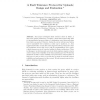Free Online Productivity Tools
i2Speak
i2Symbol
i2OCR
iTex2Img
iWeb2Print
iWeb2Shot
i2Type
iPdf2Split
iPdf2Merge
i2Bopomofo
i2Arabic
i2Style
i2Image
i2PDF
iLatex2Rtf
Sci2ools
ISPA
2004
Springer
2004
Springer
A Fault Tolerance Protocol for Uploads: Design and Evaluation
This paper investigates fault tolerance issues in Bistro, a wide area upload architecture. In Bistro, clients first upload their data to intermediaries, known as bistros. A destination server then pulls data from bistros as needed. However, during the server pull process, bistros can be unavailable due to failures, or they can be malicious, i.e., they might intentionally corrupt data. This degrades system performance since the destination server may need to ask for retransmissions. As a result, a fault tolerance protocol is needed within the Bistro architecture. Thus, in this paper, we develop such a protocol which employs erasure codes in order to improve the reliability of the data uploading process. We develop analytical models to study reliability and performance characteristics of this protocol, and we derive a cost function to study the tradeoff between reliability and performance in this context. We also present numerical results to illustrate this tradeoff.
Related Content
| Added | 02 Jul 2010 |
| Updated | 02 Jul 2010 |
| Type | Conference |
| Year | 2004 |
| Where | ISPA |
| Authors | Leslie Cheung, Cheng-Fu Chou, Leana Golubchik, Yan Yang |
Comments (0)

